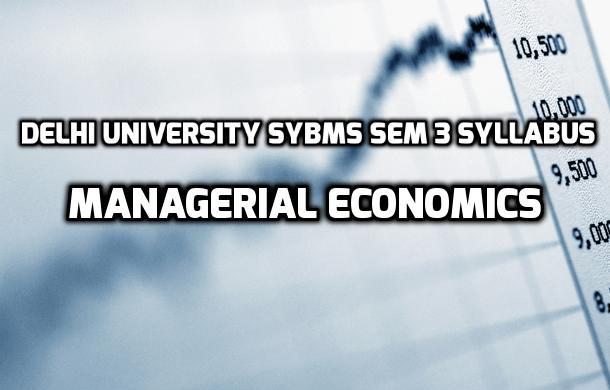Managerial economics is also known as business economics. Managerial economics bridges economic theory and economics in practice. The application of economic concepts and economic analysis to the problems of formulating rational managerial decisions is known as ‘Managerial Economics’. Managerial Economics refers to a branch of economics that applies microeconomic analysis to decision methods of businesses or other management.
Managerial Economics is a Semester 3 subject of SYBMS, Delhi University. The purpose of the subject is to apply microeconomic concepts and techniques in evaluating business decisions taken by firms. The emphasis is to explain DU BMS students how the tools of standard price theory can be employed to formulate a decision problem, evaluate alternative courses of action and finally chose among alternatives. Simple geometry and basic concepts of mathematics are used in teaching managerial economics subject.
Here we present DU SYBMS Sem 3 Syllabus: Managerial Economics:
Unit 1- 5 lectures
- Demand, Supply and Market equilibrium
- Elasticity of demand and supply
- Short run vs Long run elasticity
Unit 2 – 10 lectures
- Theory of consumer behavior
- Indifference curve theory
- Indifference curves and its properties
- Budget constraints
- Consumer choice
- Revealed preference
- Marginal utility and consumer choice.
Unit 3- 12 lectures
- Production – Technology of production
- Production with one variable input
- Production with 2 variable input
- Returns to scale
- Cost – measuring costs
- Cost in the short run and long run
- Long run vs short run cost curves
- Economies of scope
- Learning curve
Unit 4 – 23 lectures
- Theory of firm and market organization
- Perfect competition – perfectly competitive markets
- Profit maximization
- Marginal revenue
- Marginal cost
- Output in the short run and long run
- Industry’s long run supply curve
- Consumer and producer surplus
- Minimum prices
- Price support
- Import quota and tariff
- Impact of tax or subsidy
- Monopoly – monopoly power and its sources
- Social cost of monopoly power
- Monopsony
- Monopsony power
- Price determination
- Peak-load pricing and inter-temporal price discrimination
- Two-part tariffs
- Monopolistic competition and oligopoly
- Price competition
- Prisoner’s dilemma
- Cartels
- Pricing of factors – competitive factor markets
- Equilibrium in factor markets
- Factor markets with monopsony and monopoly power
Unit 5- 6 lectures
- Market failure – externalities
- Ways of correcting market failure
- Stock externalities and property rights
- Common property resources
- Public goods
- Private preferences for public goods.
Text books and reference books:
- Microeconomics – Pidyck, Rubinfeld and Mehta
- Economics (11th ed.) Oxford University Press
- Modern microeconomics, second edition, Joutosyiannis
- Microeconomics, fifth edition, Dominick Salvatore




80 Comments